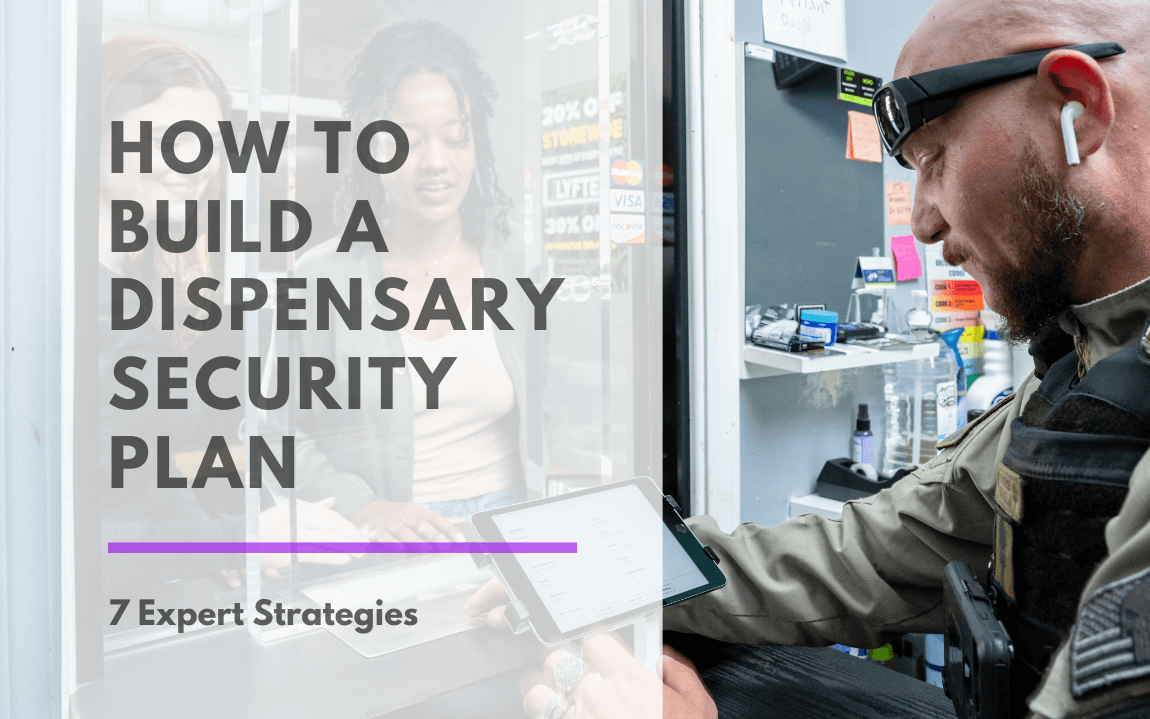Retail cannabis operators continue to face serious and growing threats to safety and security. A well-developed dispensary security plan isn’t just a compliance requirement—it’s a critical tool to protect your team, your customers, and your investment.
At Meadow, we’ve seen firsthand how devastating security incidents can be—not only financially, but emotionally and operationally. As we enter our second decade supporting cannabis retailers, we know how essential it is to have the right systems, training, and partners in place.
That’s why we’re bringing back this incredibly valuable guest post from Chris Eggers, originally published in 2021. Chris is a former law enforcement officer and the founder of Cannabis Compliant Security Solutions, with deep expertise in cannabis industry compliance and dispensary security planning.
Whether you're launching a new dispensary or upgrading your current operations, these seven strategies are a powerful foundation for building a comprehensive dispensary security plan.

Guest Author: Chris Eggers
Chris Eggers is an experienced former law enforcement officer (Oakland PD, San Francisco PD), and serves as the Los Angeles Department of Cannabis Regulation’s Subject Matter Expert (SME) in cannabis security. He is the Founder & CEO of Cannabis Compliant Security Solutions, a full-service security services firm founded in 2021 with a mission and vision dedicated to re-defining and significantly improving cannabis industry security for all licensed cannabis operators, including social equity operators and applicants. Chris has a deep understanding of cannabis compliance, and is increasingly relied upon and a trusted resource within the cannabis community and for local and national media outlets on cannabis industry security matters.
Burglaries and robberies of licensed cannabis dispensaries are increasing in frequency and offenders often carry weapons. These experiences are inherently scary and frightening. While dispensaries may operate for years and never have an incident take place, it is very important that cannabis retail staff understand the risks and be prepared for a worst case scenario. Protection of human life is paramount, and staff should be trained to never do anything to jeopardize their ability to survive an incident. Because robberies can take various forms and have many variables, all team members, staff, and security guards should be on the same page to ensure all are able to survive the incident. Although it may be nearly impossible to prevent a criminal act at or on your facility, here are seven ways to protect your cannabis dispensary from break-ins:
1. Create Standard Operating Procedures (SOPs)
Security plans are typically a requirement of the California cannabis dispensary application process. SOPs and equipment need to be specific to your business and risk profile. The DCC has very specific rules and regulations surrounding security at your facility. These need to be followed and implemented. Don’t cut corners when it comes to your security system. This doesn’t mean you need to spend outrageous amounts of money, but you do need to meet local and state requirements as well as have a system that works for your facility. Understandably, many operators are eager to get through this process and get their doors open. However, your security plan is much more than a box to check for the application process. Take time to understand the needs of your business and make sure your security plan reflects those needs. Your businesses’s SOPs within your security plan will help you and your staff understand how to deal with certain incidents. Even common tasks such as open/closing procedures need to be well thought out. Each business is different and has different needs and risk profiles. No two security plans should be the same. Ensure that your security plan and SOPs meet the needs of your business.
2. Follow the SOPs
It is critical that you ensure your employees and vendors follow the SOPs laid out within your security plan. Having a well thought out and customizable security plan is not helpful if you or your staff don’t follow it. As the business owner, you are responsible for holding your staff and security vendors accountable. In addition, you may reference your security plan as needed to ensure that your staff and vendors are performing job functions as intended, ensuring that all of your protocols are followed to your liking. Your security plan should be used as a blueprint or navigation tool that will help guide you and your staff through a variety of security related functions. You can use it to onboard employees, hold vendors and staff accountable, and dictate how certain tasks and functions should occur.
3. Conduct Regular Staff Training/Drills
Setting time aside to talk through various scenarios that you may have read about or seen on the news can be extremely helpful. Even if an incident did not occur at your facility, but you read or heard about it through the grapevine, you can learn a lot from it. When your staff and vendors are aware of the threats that exist while operating in the cannabis industry, they are likely to be more mindful, aware, and diligent. Conduct training and drills with your staff and vendors so that all personnel are on the same page. Even sitting down before the store opens and discussing different scenarios that have occurred at other facilities can be very helpful. When new employees join your team, be sure security training is part of their onboarding. When people have security and safety top of mind, you and your staff/vendors are more likely to react appropriately and be on the same page.
4. Choose the Right Vendors & Control Sensitive Information
Not all guard companies are the same, not all installation companies are the same either. Take your time choosing the right vendors to work at/on your facility. Make sure that your vendors are compliant with all of the rules and regulations that govern them. Read their contracts carefully and ask questions if you have them. Some vendors are less reliable than others and that may be reflected in their contract. Ensure that the contact holds them accountable for their actions and work. Picking the right vendor the first time can save you lots of time, money, and headaches. “Inside jobs” are common in any industry and the cannabis industry is not immune. It is important to properly vet your employees AND vendors (especially security personnel) as there have been well documented incidents of guards engaging in criminal activity.
5. Ensure Your Dispensary is Well-Lit
Having a well-lit facility can go a long way in preventing a break-in. Many offenders look for low hanging fruit, and although some will go to great lengths to break into a facility, if your space is well lit, you have a better chance of the offender being seen by a staff member or witness. A well-lit facility also aids in capturing clear video of an offender. Note: Cameras play a big role in your security solution but may not provide the deterrence that they once did.
6. Assess & Evolve Your Security
Auditing your security can go a long way in addressing any deficiencies that may arise. Having a trained consultant to your facility to conduct a security assessment can help identify security deficiencies (hardware, SOPs, negligent vendors) and areas of non-compliance. Security assessments provide a great deal of detail and should be shared under NDA. As your business grows and changes, so should your security plan. It is a good practice to audit and review your security plan once a quarter. Some tasks and procedures may need to be changed as your business and the industry evolves.
7. Choose the Right Insurance Policy
It is impossible to predict if your business will be a target or not. But if an incident does occur, it is imperative that you recover on your insurance claim. In order to do that, you must understand what your policy requires of you. Some insurance policies have very specific language about necessary hardware (i.e., multi-point locking entrances). If your facility does not meet the criteria of your policy, you may not recover a cent on a claim.
If you need help setting up a cannabis retail security plan, consider reaching out to Chris and his team at Cannabis Compliant Security Solutions.
More Resources to Strengthen Your Dispensary Security Plan
The strategies outlined above emphasize the importance of clear procedures, consistent staff training, and strong operational controls—all essential components of a solid dispensary security plan.
To help extend these practices into your daily operations, we’ve compiled additional resources focused on loss prevention and standard operating procedures:
These tools support the ongoing execution of your dispensary security plan—helping you protect your business, prevent loss, and keep your team aligned and prepared.
Explore more articles about cannabis retail best practices on the Meadow blog.


